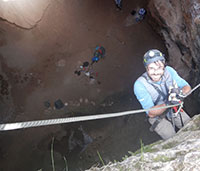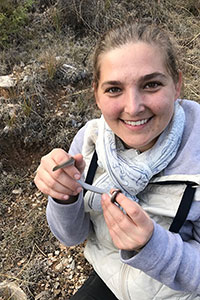 John J. Jacisin III. Department of Integrative Biology, The University of Texas. Austin, Texas, USA. john.jacisin@austin.utexas.edu
John J. Jacisin III. Department of Integrative Biology, The University of Texas. Austin, Texas, USA. john.jacisin@austin.utexas.edu
John Jacisin III is a vertebrate paleontologist, conservation paleobiologist, and evolutionary morphologist who specializes in Cenozoic herpetofauna, morphometrics, and conservation paleobiology. John is currently a postdoctoral scholar in the Department of Integrative Biology, University of Texas at Austin. In his role at UT Austin, he studies the adaptive radiation and phenotypic diversity of Anolis ecomorphs via the lens of cranioskeletal features in relation to ecology and environmental change through time, and additionally mentors undergraduate and graduate students. John also describes Cenozoic reptiles and amphibians during periods of great environmental change such as the Eocene-Oligocene, Miocene, and Quaternary-present. He develops methods combining data from the past and present of to understand organisms’ functional-environment relationships through time for conservation purposes, including new ecometrics using geometric morphometrics of snake communities.
![]()
 A. Michelle Lawing. Department of Ecology and Conservation Biology, Texas A&M University. College Station, Texas, USA. alawing@tamu.edu
A. Michelle Lawing. Department of Ecology and Conservation Biology, Texas A&M University. College Station, Texas, USA. alawing@tamu.edu
ichelle Lawing is an Associate Professor in the Department of Ecology and Conservation Biology at Texas A&M University. Her research is focused on how biodiversity responds to climate change and her approach involves interdisciplinary work at the nexus of conservation biology, ecology, evolution, and paleontology. Her work includes the investigation of geographic, evolutionary, and morphological responses of species and communities to environmental changes in the Anthropocene, Late Pleistocene, and throughout the Miocene to present. She is involved in developing methods to better harness ecological niche and species distribution models, geometric morphometric models, and phylogenetic comparative methods. Before joining TAMU, Dr. Lawing was a postdoctoral fellow at the National Institute for Mathematical and Biological Synthesis (NIMBioS).

